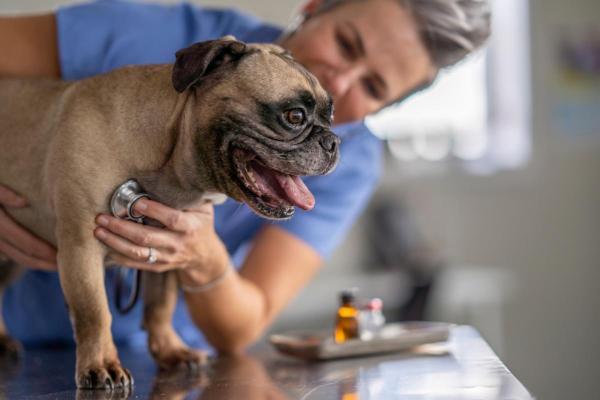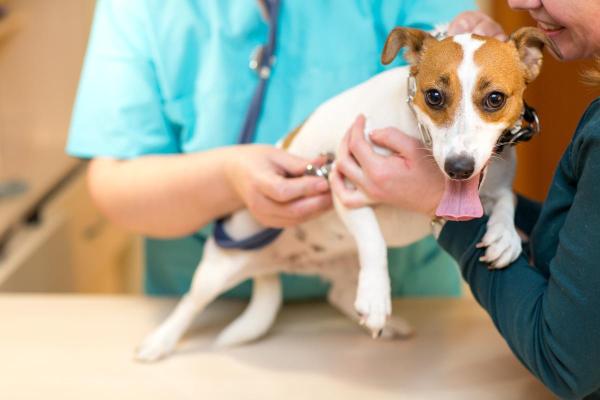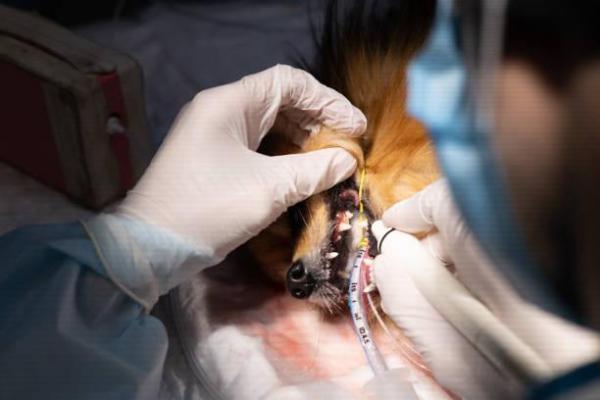My Dog Is Breathing Heavy While Resting



See files for Dogs
Heavy breathing is an increase in respiratory rate above normal and is known medically as tachypnea. It may or not be accompanied by dyspnea, the medical term for respiratory distress. Panting is a form of heavy breathing, but it is not always a sign of a problem. Panting is a normal reaction to various stimuli such as exercise, excessive ambient heat or pain. When heavy breathing does occur, we need to look at the context of the behavior. This is why AnimalWised finds out why my dog is breathing heavy while resting? Although heavy panting is normal in the circumstances we mentioned, resting or sleeping is not a time when this is normal. We find out why heavy breathing in dogs occurs at rest and what we may do about it.
Breed predisposition
There are certain breeds that are more prone to respiratory problems. Brachycephalic breeds include the English Bulldog, Boxer and Pug. These dogs are affected by brachycephaly, a condition which is characterized by the following structural aberrations:
- Narrow sinuses
- Lack of tracheal development
- Elongated palate
- Laryngeal abnormalities
These conditions can result in heavy breathing even while resting. Brachycephalic dog breeds are not the only ones with a greater propensity toward respiratory problems which can cause heavy breathing. Small dog breeds such as the Yorkshire Terrier or Pomeranian are more likely to suffer spontaneous tracheal collapses. This makes breathing very difficult or a greater rate of breathing, even when at rest.
Treatment
Often these problems are not treated directly, but their symptoms are managed and lifestyle changes are made to reduce the possibility of serious illness. In some cases of brachycephaly, the structural malformations can pose a sufficiently seriously risk that surgical intervention is required. In these cases, they can perform operations to widen the nostrils or reduce the length of the soft palate.
Tracheal collapses may require the placement of a prosthesis or stent to maintain the structural integrity of this organ. If you live with any of these breeds and are interested in curing these diseases, we recommend going to your trusted veterinarian to investigate the possibility of treating these issues.

Upper respiratory tract problems
When we see our dog is breathing heavy when resting, the first thing we should do is check their upper respiratory tract. This is the part of the dog's internal tissues which includes the nasal cavity, pharynx and larynx. In this situation, tachypnea in dogs can be accompanied by inspiratory noises. When passing through the upper airways, the airflow collides with some structures that are not normally present. The most common symptoms are snoring, rales (heavy breathing sounds), coughing, difficulty swallowing and retching.
When we see this clinical picture of breathing difficulties in dogs, it may be due to one of the following medical issues:
- Stenosis of the nostrils
- Nasal fibrosis
- Rhinitis
- Tumors
- Polyps
- Laryngeal paralysis
- Brachycephalic syndrome
Treatment
If the dog breathes very quickly at rest due to any of the aforementioned diseases, we will need to take them to a veterinarian. In the case of a medical emergency, they will need to stabilize the dog by providing oxygen, sedation to reduce stress and possibly even intubation to allow airflow to the lungs.
You can better understand the nature of these breathing difficulties by looking at the anatomy of a dog's respiratory system.
Lower respiratory tract problems
Dogs with problems of the trachea or lungs means there is an issue with the lower respiratory tract. In the latter, the problem could be with the alveoli, pulmonary interstitium or blood vessels usually present tachypnea, making it difficult for the lung to expand completely. On auscultation of the pet, an increase in respiratory sounds is detected.
Lung problems are often the result of cardiac issues since a malfunction of the heart can also lead to respiratory difficulties such as breathing heavy when at rest. We might see this if the heavy breathing is accompanied by the dog's heart beating very fast. For this reason, a complete examination will be required to determine the origin of the symptoms.
In addition to cardiac issues, the following can cause lung problems in dogs:
- Upper airway problems
- Concussions
- Cranioencephalic trauma
- Vasculitis
- Pneumonia
- Hemorrhage
- Tumors
- Parasites
- Respiratory distress syndrome
- Idiopathic pulmonary fibrosis
Treatment
The treatment will be different depending on the cause. If the problem is related to heart disease, medications may be given to reduce the strain on the heart and, subsequently, reduce heavy breathing. In some cases, surgical intervention may be required to fix the problem. Factors such as age and health status of the dog will need to be considered since not all animals will be good candidates for surgery.
In some causes, specific drugs must be used to eliminate the pathogen. This can be in the form of antibiotics if bacterial pneumonia is the cause or antiparasitic drugs if heavy breathing is caused by parasites. Adopting good prevention and vaccination measures can considerably reduce the probability of suffering from these diseases.
The rest of the causes usually require analgesia and emergency treatment due to the severity of the clinical picture. In some cases, the dog may need a tracheostomy to open up the windpipe and allow air to enter the lungs. If you see your dog has labored breathing while resting associated with these causes, we recommend that you go to an emergency veterinarian as soon as possible.
Learn about laryngeal paralysis in dogs, another condition which may cause issues with the lower respiratory tract.

Chest problems
If your dog breathes very quickly while at rest, the problem might not be in the respiratory tract itself, but in other parts of the chest. Issues in the pleural cavity or other parts of the thorax can lead to breathing difficulties such as heavy breathing. These can happen while resting because the actions of the disease don't stop when the dog is at rest. Any alteration at the level of these structures can trigger severe respiratory problems.
Some of the causes that can trigger heavy breathing include:
- Pneumothorax
- Pyothorax
- Hemothorax
- Pleural effusion
- Tumors
- Diaphragmatic hernia
- Trauma
- Nervous problems
- Muscular problems at the thoracic level
Treatment
Treatment also depends on the specific cause that produces the symptoms. In many cases it is necessary to perform a thoracentesis to release the fluid inside the pleural space. In addition, intubating and ventilating the patient is essential. When a dog's heavy breathing is advanced, it can appear as if the dog is suffocating

Stress, heat or pain
Stressful situations, extreme heat or pain can promote the appearance of labored breathing in dogs when they are at rest. In these cases there would not be any underlying respiratory disease, but rather the dog is reacting this way to adapt to the situation. If the cause of such heavy breathing in dogs while resting is resolved, the tachypnea should disappear.
Treatment
It is necessary to determine the cause of the problem to treat it. For example, if the temperatures are very high and the dog is hot to the point of breathing very quickly at rest, there is a possibility they may be suffering from heat stroke. This makes it necessary to go to the veterinary center immediately.
Joint diseases in older dogs can cause discomfort and pain that makes them react that way. The same thing happens with stress caused by changes in their routine or pain cause by some sort of trauma.

Other causes of dog heavy breathing while resting
If the previous causes have been ruled out and the origin of the problem has not been defined, more specific diagnostic tests such as x-rays or an ultrasound need to be carried out. Other tests such as analysis of pleural fluid with a microbiological culture, laryngeal examination, rhinoscopy, fluoroscopy, tracheal lavage, alveolar lavage, lung aspirate, CT and others may be used to determine the cause.
There are drugs that can improve respiratory function such as diuretics (in case of heart failure), bronchodilators or corticosteroids. What may seem like an unimportant event may mean that the dog is suffering from a relatively serious illness, so any process in which tachypnea appears should be closely monitored. For all these reasons, if your dog breathes very quickly while resting, we recommend going to the vet urgently. This is especially the case if it happens very quickly.
Learn more about how context of labored breathing can help us to know the cause with our article on why a dog is breathing heavily through the nose.
This article is purely informative. AnimalWised does not have the authority to prescribe any veterinary treatment or create a diagnosis. We invite you to take your pet to the veterinarian if they are suffering from any condition or pain.
If you want to read similar articles to My Dog Is Breathing Heavy While Resting, we recommend you visit our Breathing diseases category.
- Textbook of Veterinary Internal Medicine, 8th Edition








